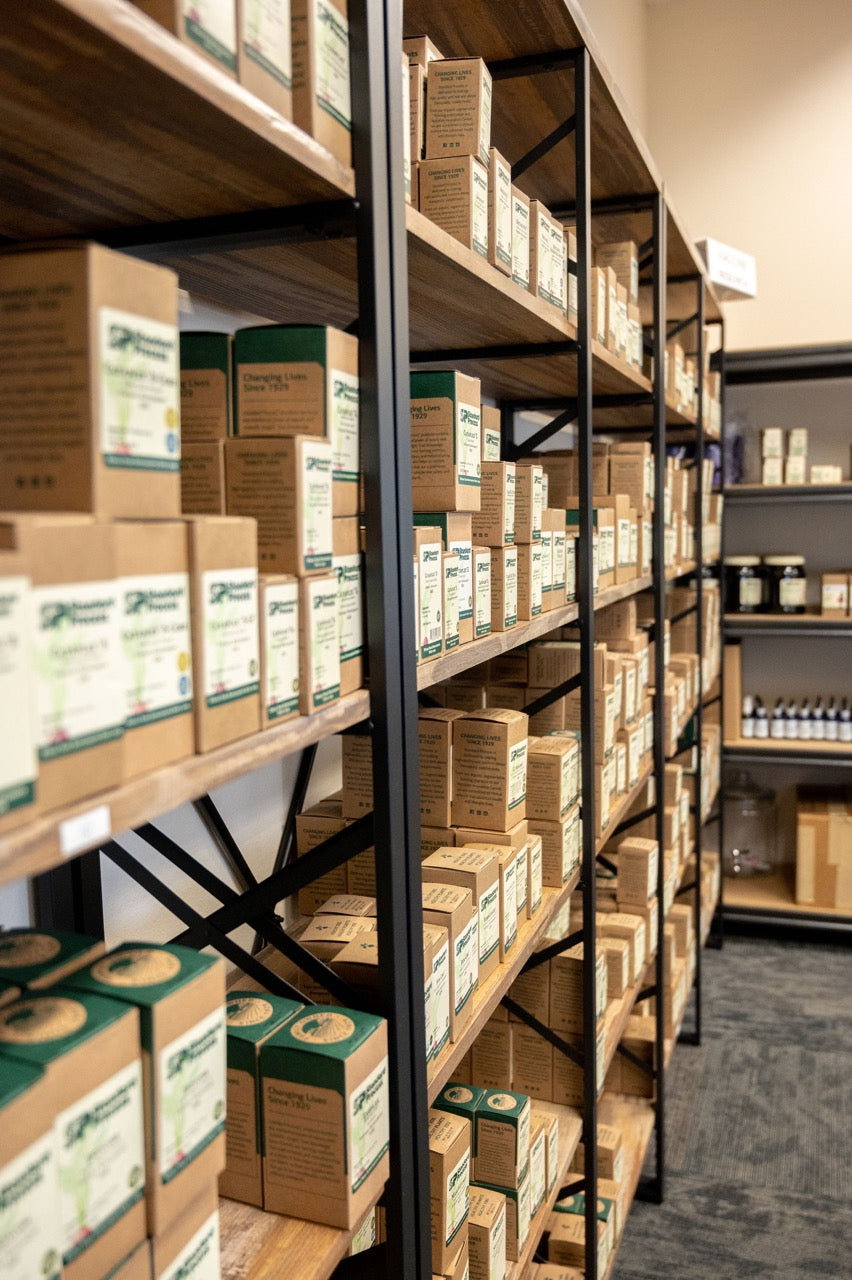Unveiling the Hidden Immune Challenges
Bacteria, mold, yeasts, parasites, biotoxins, and viruses hinder your body's energy reserves and keep you from feeling your best.


Just as a detective solves a complex case, you too have the power to discover and confront the covert foes of your health – the stealth pathogens. These hidden adversaries, including bacteria, mold, yeasts, parasites, biotoxins, and viruses, often dwell undetected in our bodies, waiting to emerge.
Join us on an enlightening journey to learn how we can cleverly counter these threats with nature's remedies, supported by scientific insights.
Prior to the onset of viruses, people frequently experience colonization by yeasts and bacteria that may not immediately manifest symptoms, leading to subclinical conditions. Commonly, individuals visit healthcare providers expressing concerns such as, "I'm starting to feel like I might be coming down with a cold," or noting uncertainties about the reliability of lab tests, like the practitioner is guessing.
The incubation period, the interval from when bacteria or viruses enter the body to when symptoms first emerge, is a critical phase. In this phase, bacteria multiply to levels that might eventually trigger symptoms and become identifiable in medical tests. This period is ideal for supporting the immune system with herbs and food-based nutrients.

Your Clues to Understanding Subclinical Immune Issues
Stealth pathogens, which include certain bacteria, viruses, parasites, and molds that can reside in the body without causing immediate symptoms, can lead to a variety of symptoms when they become active.
The symptoms experienced depend on the type of pathogen, the individual's immune system, and other health factors. Here are some common symptoms associated with different types of stealth pathogens:
- Fever and Chills: Often a sign of the body's immune response to infection.
- Fatigue and Weakness: A common symptom that can range from mild to severe.
- Muscle and Joint Pain: Can occur in various parts of the body.
- Respiratory Symptoms: Including cough, difficulty breathing, and chest pain.
- Skin Lesions or Rashes: Rashes, blisters, or sores, particularly in viral reactivations like herpes or shingles.
- Gastrointestinal Issues: Such as diarrhea, abdominal pain, nausea, and vomiting.
- Headaches: Can range from mild to severe and be accompanied by other neurological symptoms.
- Cognitive Impairments: Including confusion, difficulty concentrating, or memory problems.
- Weight Loss: Unintentional weight loss due to decreased appetite or malabsorption.
- Night Sweats: Excessive sweating during the night.
- Swollen Lymph Nodes: Indicative of an immune response.
- Sore Throat: Often accompanied by increased mucous and other respiratory symptoms.
- Oral or Genital Thrush: Overgrowth of Candida can cause white patches and soreness.
- Visual Problems: In severe cases, especially with certain parasitic infections.
- Mood Changes: Including irritability or depression.
Here, our specially curated selection of products comes into play. We offer MediHerb's Andrographis Complex alongside drainage remedies such as Thymex and

The Maze of Hidden Threats
Stealth pathogens, the secretive thieves of our vitality, can elude detection while residing within our bodies, slowly undermining our immune defenses. Here's a glance at the current understanding of these stealth pathogens:
- Bacteria: Some bacteria can exist in a dormant state within our bodies, awakening under certain conditions. For instance, Mycobacterium tuberculosis, which causes tuberculosis, can lie latent for years before becoming active.
- Viruses: Various viruses are capable of establishing latent infections. Herpes viruses, such as HSV and VZV, remain dormant in the nervous system after initial infection and can reactivate later to cause ailments like cold sores or shingles.
- Parasites: Certain parasites can reside within a host for extended periods without causing immediate symptoms. Toxoplasma gondii, for example, can be latent in the body and activate severe symptoms if the immune system is compromised.
- Molds, Yeast and Fungi: Some fungi, like Candida, can colonize the body harmlessly but may cause issues like candidiasis if the immune system weakens or the microbial balance is disturbed.
Understanding these stealth pathogens is vital for several reasons: managing and preventing disease outbreaks by understanding their latency and reactivation, enhancing treatments and preventive strategies by studying their interactions with the immune system, and comprehending disease progression.
Ongoing research continues to shed light on these pathogens, their evasion tactics, reactivation triggers, and treatment strategies, especially crucial for immunocompromised individuals.

The Herbal Toolkit
Our first set of tools includes Andrographis, Echinacea, and Holy Basil. These herbs have been backed by clinical research, showing their effectiveness in boosting the immune system:
Andrographis: Research supports Andrographis' ability to boost the immune system.
A study in 2021 involving 30 healthy adults showed positive effects within 30 days of taking Andrographis supplements.
Andrographis, used in Ayurvedic medicine and Traditional Chinese Medicine (TCM), demonstrates immune-enhancing activity in both in vitro and in vivo studies. It has been traditionally used for its anti-inflammatory, hepatoprotective, antiviral, antioxidant, and immune-enhancing properties.
leaf and stem might work by stimulating the immune system and preventing flu viruses from binding to cells.
Echinacea: Recent research sponsored by the National Center for Complementary and Integrative Health (NCCIH) suggests that Echinacea's effect on immune cells may depend on the types and amounts of bacteria within the Echinacea plants. The soil composition where the plants are grown can affect this bacterial community.
A review on the immunomodulatory/anti-inflammatory activity of Echinacea spp. focused on the phytochemical research and strategies to obtain novel agents to supplement current therapies.
Echinacea supplementation may be associated with a decrease in pro-inflammatory cytokines (IL-6, IL-8, TNF) and an increase in the anti-inflammatory cytokine IL-10, although the risk of bias in these studies was generally high.
Laboratory and animal studies suggest that Echinacea contains active substances that boost immune function, along with having pain-relieving, anti-inflammatory, antiviral, and antioxidant effects.
Holy Basil (Tulsi): Tulsi has been found to have multiple therapeutic actions, including adaptogenic, antimicrobial, anti-inflammatory, cardioprotective, and immunomodulatory effects, based on in vitro, animal, and human studies.
Holy Basil is known to improve the immune system, counteract stress, boost metabolism, protect the liver, reduce inflammation, and protect against radiation.
Scientific studies indicate that Holy Basil possesses anti-inflammatory, analgesic, antipyretic, antidiabetic, hepatoprotective, hypolipidemic, antistress, and immunomodulatory activities.
A double-blind trial conducted in 2011 suggested that an alcoholic extract of Holy Basil modulates immunity, thus promoting immune system function.
These herbs are all contained in

Immunomodulatory Effects: The Key to Reducing Pathogens
These herbs possess immune supporting properties, aiding in normalizing the immune response, crucial for those with immune dysfunctions. By modulating the immune system, they help in the strategic takedown of stealth pathogens.
Taking herbs like Andrographis, Echinacea, and Holy Basil may benefit individuals with underlying immune issues for several reasons:
- Immunomodulatory Effects: These herbs have been reported to possess immunomodulatory properties, meaning they can help modulate the immune system's response. This can be particularly beneficial for people with immune dysfunctions, as these herbs may aid in normalizing the immune response.
- Anti-inflammatory Properties: Chronic inflammation is a common issue in many immune-related disorders. These herbs have shown anti-inflammatory effects, which can help reduce inflammation in the body and potentially alleviate symptoms associated with immune dysfunctions.
- Antioxidant Effects: Oxidative stress is another factor that can exacerbate immune-related issues. The antioxidant properties of these herbs can help combat oxidative stress, thereby supporting overall immune health.
- Stress Reduction: Stress is known to negatively impact the immune system. Some of these herbs, especially Holy Basil, have adaptogenic properties, meaning they can help the body cope with stress more effectively. This can be beneficial for individuals with immune issues, as managing stress is crucial for maintaining immune health.
- Antimicrobial Properties: These herbs also exhibit antimicrobial effects, which can be helpful in protecting against infections, especially in individuals whose immune systems are compromised or not functioning optimally.
- Enhancing General Immune Function: These herbs are believed to enhance general immune function by stimulating the activity of certain immune cells or increasing the production of immune-boosting cytokines. This can help bolster the body's natural defense mechanisms.

Opening up the Lymphatics and Liver with “The Cleansing Crew”
Once we have effectively tackled the hidden health threats, it's paramount to focus on cleansing and rejuvenating our system to ensure optimal health. This is where "The Cleansing Crew," comprising Thymex and
Thymex for Thymus Support
Thymex is designed to support the thymus gland, an integral component of our immune system. The thymus gland, located in the chest just above the heart, is where T-cells mature. T-cells are a type of white blood cell that plays a central role in immune response. They are responsible for attacking infected cells and for activating other immune cells. As we age, the thymus gland gradually shrinks and becomes less active, which can impact our immune response. Thymex aids in:
- Maintaining Thymus Health: It provides essential nutrients and support to help maintain the health and functionality of the thymus gland.
- Enhancing T-Cell Production: By supporting the thymus, Thymex may help in the production and maturation of T-cells, vital for a robust immune response.
- Regulating Immune Response: A well-functioning thymus gland ensures a balanced immune response, preventing overreaction that can lead to autoimmune disorders.

Spanish Black Radish for Detoxification
Spanish Black Radish plays a significant role in the detoxification process. This root vegetable is known for its high nutrient content and detoxifying properties.
It supports the body’s natural detoxification pathways, primarily the liver and digestive system. The benefits of Spanish Black Radish include:
- Sulfur-Rich Properties: Spanish Black Radish contains compounds like sulforaphane and indoles, which are known for their antioxidant and anti-inflammatory properties. These compounds help in neutralizing harmful free radicals and reduce oxidative stress in the body.
- Liver Support: It assists the liver in processing and eliminating toxins. The compounds in Spanish Black Radish stimulate bile flow, which helps in breaking down fats and aids in the removal of waste products from the liver.
- Digestive Health: This radish is rich in fiber, which promotes healthy digestion and regular bowel movements, essential for expelling toxins from the body.
Proceed with Care: Navigating the Die-Off Effect in Our Wellness Journey
When undertaking a regimen aimed at addressing stealth pathogens, such as those involving Thymex, Wormwood Complex and Andrographis, it's important to approach the process with caution and moderation due to the potential effects of 'die-off'. Die-off, also known as the Herxheimer reaction, occurs when a large number of pathogens are killed off quickly, releasing toxins into the body at a rate that can overwhelm the body's ability to eliminate them. This can lead to symptoms like fatigue, headaches, and flu-like symptoms.
To mitigate these effects, it's advisable to start any new treatment slowly and incrementally increase the dosage or intensity. This gradual approach allows your body to adjust to the changes and detoxify at a manageable pace. Monitoring your body’s response and adjusting accordingly helps in ensuring a smoother and more comfortable transition towards improved health. Remember, patience and careful progression are key in achieving long-term wellness benefits without overwhelming your system.
Conclusion: Rebuilding After The Stealth Pathogen Supplement Plan
In summary, the herbs in Andrographis Complex comprehensive approach to addressing stealth pathogens. Thymex bolsters the thymus gland, enhancing immune response, while Spanish Black Radish supports detoxification, ensuring the body is cleared of any residual pathogens and toxins. Together, they contribute to a rejuvenated, healthy immune system, ready to tackle any future threats.
With the culprits eliminated, we focus on repairing the damage. This phase is all about using our renewed energy to mend tissues and rejuvenate organs, leading to enhanced vitality and wellbeing. If you want to assess which organs are weak, checkout our Nutritional Assessment. Your assessment can pinpoint fatigued body systems so you can better understand the foundational vitamins, minerals and PMG’s needed to revitalize your body.
As our journey concludes, we emerge with a transformed understanding of immune health. Leveraging the power of Andrographis, Echinacea, Holy Basil, Thymex, and Spanish Black Radish, we not only conquer hidden enemies but also forge a path to a stronger, revitalized body.

Helpful links and references
Jamshidi N, Cohen MM. The Clinical Efficacy and Safety of Tulsi in Humans: A Systematic Review of the Literature. Evid Based Complement Alternat Med. 2017;2017:9217567. doi: 10.1155/2017/9217567. Epub 2017 Mar 16. PMID: 28400848; PMCID: PMC5376420.
Cohen MM. Tulsi - Ocimum sanctum: A herb for all reasons. J Ayurveda Integr Med. 2014 Oct-Dec;5(4):251-9. doi: 10.4103/0975-9476.146554. PMID: 25624701; PMCID: PMC4296439.
Baliga MS, Jimmy R, Thilakchand KR, Sunitha V, Bhat NR, Saldanha E, Rao S, Rao P, Arora R, Palatty PL. Ocimum sanctum L (Holy Basil or Tulsi) and its phytochemicals in the prevention and treatment of cancer. Nutr Cancer. 2013;65 Suppl 1:26-35. doi: 10.1080/01635581.2013.785010. PMID: 23682780.
Hosamane M, Acharya AB, Vij C, Trivedi D, Setty SB, Thakur SL. Evaluation of holy basil mouthwash as an adjunctive plaque control agent in a four day plaque regrowth model. J Clin Exp Dent. 2014 Dec 1;6(5):e491-6. doi: 10.4317/jced.51479. PMID: 25674314; PMCID: PMC4312674.
Okhuarobo A, Falodun JE, Erharuyi O, Imieje V, Falodun A, Langer P. Harnessing the medicinal properties of Andrographis paniculata for diseases and beyond: a review of its phytochemistry and pharmacology. Asian Pac J Trop Dis. 2014 Jun;4(3):213–22. doi: 10.1016/S2222-1808(14)60509-0. PMCID: PMC4032030.
Rajanna M, Bharathi B, Shivakumar BR, Deepak M, Prashanth D, Prabakaran D, Vijayabhaskar T, Arun B. Immunomodulatory effects of Andrographis paniculata extract in healthy adults - An open-label study. J Ayurveda Integr Med. 2021 Jul-Sep;12(3):529-534. doi: 10.1016/j.jaim.2021.06.004. Epub 2021 Aug 8. PMID: 34376353; PMCID: PMC8377179.
Aviva Romm, Bevin Clare, Lisa Alschuler, Christopher Hobbs, Roy Upton, CHAPTER 8 - Vaginal Infections and Sexually Transmitted Diseases,Editor(s): Aviva Romm, Mary L. Hardy, Simon Mills, Botanical Medicine for Women's Health, Churchill Livingstone, 2010, Pages 256-289,ISBN 9780443072772, https://doi.org/10.1016/B978-0-443-07277-2.00010-6.
(https://www.sciencedirect.com/science/article/pii/B9780443072772000106) Caceres, D. D., Hancke, J. L., Burgos, R. A., and Wikman, G. K. Prevention of common colds with Andrographis paniculata dried extract: A pilot double blind trial. Phytomedicine 1997;4:101-104.
Barrett B, Brown R, Rakel D, Mundt M, Bone K, Barlow S, Ewers T. Echinacea for treating the common cold: a randomized trial. Ann Intern Med. 2010;153(12):769-77.
Mount Sinai. (n.d.). Echinacea. Retrieved from https://www.mountsinai.org/health-library/herb/echinacea





